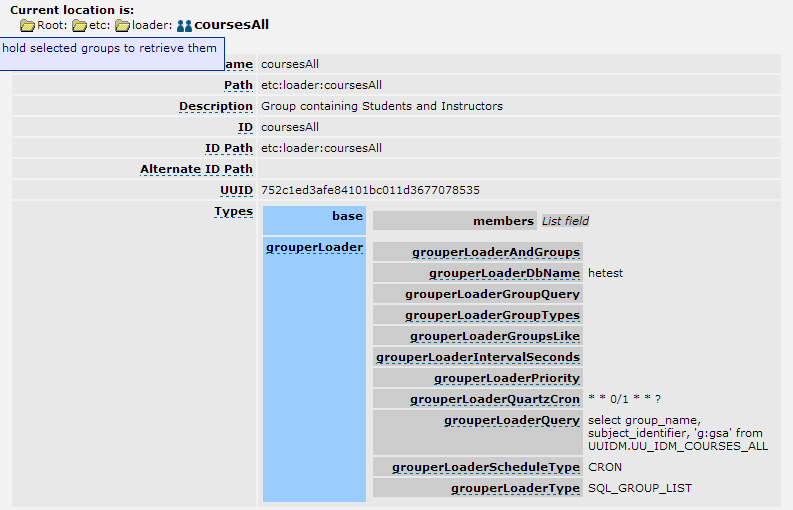grouper-users - RE: [grouper-users] Designing Groups
Subject: Grouper Users - Open Discussion List
List archive
- From: Chris Hyzer <>
- To: "Bryan E. Wooten" <>, David Langenberg <>
- Cc: "" <>
- Subject: RE: [grouper-users] Designing Groups
- Date: Wed, 12 Feb 2014 17:15:56 +0000
- Accept-language: en-US
|
It must be the fully qualified group system name. i.e. uofu:campus:courses:…:001:students If it was just “students” that doesn’t uniquely identify a subject Ok? From: Bryan E. Wooten [mailto:]
Hmmm, having a little trouble. Getting this error in my log file: 2014-02-12 09:14:06,379: [main] ERROR GrouperLoaderResultset$Row.getSubject(1197) - - Problem with subjectIdentifier: students, subjectSourceId: , in jobName : SQL_GROUP_LIST__etc:loader:coursesAll__752c1ed3afe84101bc011d3677078535 edu.internet2.middleware.subject.SubjectNotFoundException: subject not found: students And in the shell I get this: group = GroupFinder.findByName(grouperSession,"uofu:campus:courses:currTerm:AR:AR:ARCH:Adv Des Work:2632:001:students"); // Error: unable to evaluate command: Sourced file: inline evaluation of: `` group = GroupFinder.findByName(grouperSession,"uofu:campus:courses:currTerm:AR:
. . . '' : Method Invocation GroupFinder.findByName // See error log for full stacktrace // caused by: edu.internet2.middleware.grouper.exception.GroupNotFoundException: // Cannot find group with name: 'uofu:campus:courses:currTerm:AR:AR:ARCH:Adv Des Work:2632:001:students' But in the UI I see this:
My Loader job looks like this:
I think if all looks correct, but obviously something is wrong. Any ideas? -Bryan From: Chris Hyzer []
Yes, but the subject_id for gsa is the uuid of the group. If you want to use the group system name, then have the column be “subject_identifier”. Also, the
source needs to be “g:gsa”, unless you have modified the default in the sources.xml Thanks, Chris From: Bryan E. Wooten []
I think I get it. Instead of have the SQL return all course sections and their students or instructors have the sql just return all the course sections and two rows as subjectID.
These being “students” and “instruction” since we know that each section has groups by these names. These groups then become the members of the ‘all’ group. I also need to change the subject source in the Loader query to ‘GSA’ since that is where subjectID lives (ie the group students or instructors)? I think I am getting this right? -Bryan From: Chris Hyzer []
I would not make a duplicate group that has all the members of students and instructors. I think you can do what dave is saying, though it should be a loader job, so it will change dynamically as the groups are added/deleted (with “like” string). So you can create a query against peoplesoft that returns group_name (the overall group), and subject_identifier (the group name of the member which is the
students group or instructors group). So basically this will return twice the number of rows as courses that you have. If you have a dblink and can join to the grouper groups table and get the uuid of the group in a subject_id col that would be quicker,
though it is not a requirement. Ok? Thanks, Chris From:
[]
On Behalf Of David Langenberg Use GSH to create a :all group with the :students and :instructors groups as members? Dave On Tue, Feb 11, 2014 at 10:51 AM, Bryan E. Wooten <> wrote: I’ve run into a mental block in designing my groups. I have created 2 Grouper Loader jobs using SQL_GROUP_LIST. One creates groups for each course section with students as members. The other creates groups for each course section
with instructors as members. Both run SQL against our PeopleSoft SIS. I need a group for each course section that includes both instructors and students. I see 2 ways to accomplish this, one I know I can make work. The easiest thing to do would be create a third SQL_GROUP_LIST using SQL that returns both instructors and students in one query. But I was wondering if I might be better of creating Grouper Loader job that executes a query against the Grouper DB (GSA) the returns the members of the groups I created above. I didn’t see any way to leverage composite groups to achieve my goal. And I didn’t see a way to leverage include groups either. Any thoughts or opinions invited. -Bryan
-- Identity & Access Management The University of Chicago |
- [grouper-users] Designing Groups, Bryan E. Wooten, 02/11/2014
- Re: [grouper-users] Designing Groups, David Langenberg, 02/11/2014
- RE: [grouper-users] Designing Groups, Chris Hyzer, 02/11/2014
- RE: [grouper-users] Designing Groups, Bryan E. Wooten, 02/12/2014
- RE: [grouper-users] Designing Groups, Chris Hyzer, 02/12/2014
- RE: [grouper-users] Designing Groups, Bryan E. Wooten, 02/12/2014
- RE: [grouper-users] Designing Groups, Chris Hyzer, 02/12/2014
- RE: [grouper-users] Designing Groups, Bryan E. Wooten, 02/12/2014
- RE: [grouper-users] Designing Groups, Chris Hyzer, 02/12/2014
- RE: [grouper-users] Designing Groups, Chris Hyzer, 02/12/2014
- RE: [grouper-users] Designing Groups, Bryan E. Wooten, 02/12/2014
- RE: [grouper-users] Designing Groups, Chris Hyzer, 02/12/2014
- RE: [grouper-users] Designing Groups, Bryan E. Wooten, 02/12/2014
- RE: [grouper-users] Designing Groups, Chris Hyzer, 02/11/2014
- Re: [grouper-users] Designing Groups, David Langenberg, 02/11/2014
Archive powered by MHonArc 2.6.16.

